The Story of Aliman
Reading time: 8 min
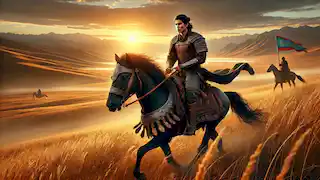
About this story: The Story of Aliman is a Legend from Kazakhstan set in the Medieval This Dramatic tale explores themes of Courage and is suitable for All Ages. It offers Historical insights. A warrior’s quest to unite the Kazakh tribes and reclaim their homeland.
The vast Kazakh steppe, a seemingly endless ocean of grasslands stretching from the Altai Mountains to the Caspian Sea, is a land that has witnessed centuries of survival, heroism, and legends passed down through generations. It is a place where the wind sings the songs of ancient warriors, and the earth remembers every hoofbeat of galloping horses.
Among the most enduring tales is the story of Aliman, a young warrior who rose from humble beginnings to unite the fractured Kazakh tribes during one of the darkest times in their history. His story is not only one of bravery and battle but of resilience, leadership, and an unwavering connection to the land his people called home.
Born of the Steppes
Aliman was born in the village of Karkaraly, a settlement tucked against the foothills of the mighty Altai Mountains. It was the end of winter, a season when the Kazakh people looked to the skies for the first signs of spring. A single hawk circled overhead as Aisha, his mother, held him close for the first time.
His father, Serik, a skilled horseman and renowned warrior, looked at the newborn and whispered, *“Aliman,”*—a name that meant resilient soul. “He will endure the storms of life and rise stronger with each passing trial,” Serik proclaimed to the village elders.
Even as a child, Aliman seemed different. His gaze held a quiet intensity, and he learned quickly. While other boys spent their days chasing shadows or playing games, Aliman followed his father across the plains, learning the ways of the steppe—how to ride, hunt, and read the stars.
At ten years old, Serik gifted him a black foal named Karak—a spirited and untamed horse.
“Earn his trust,” Serik said. “A man who understands his horse will never be defeated.”
It took months of patience, but when Karak finally allowed Aliman to ride, they became inseparable.
Whispers of War
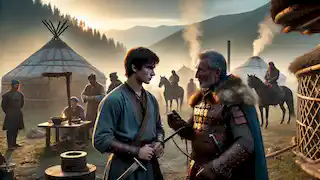
As Aliman grew into a young man, whispers of war began to spread. Raiders from the east—invaders with no loyalty to the land—had crossed into Kazakh territory, burning villages and enslaving the people.
The Kazakh tribes, once united under the banner of their ancestors, had become fractured over generations of infighting. Each clan guarded its own borders, mistrustful of one another, unable to unite against the common threat.
One evening, the peaceful village of Karkaraly was shattered by the distant glow of fire. A neighboring settlement, Taldyk, had been razed to the ground. Serik called for an emergency meeting with the village elders.
“This cannot continue,” Serik said, his voice a mix of anger and sorrow. “If we do not unite, there will be nothing left of our people or our lands.”
The elders murmured their agreement, but they were old men—wise but cautious, fearful of the war they knew was coming.
Aliman, now eighteen, listened quietly to his father and the council. That night, he stood alone atop a hill overlooking the vastness of the steppe. Smoke from the burning village still lingered in the air, and the stars seemed dimmer than before.
“This is not the way it should be,” he whispered to himself, clutching the hilt of his father’s sword. “I will not let them take our home.”
The Death of a Father
It was not long before the invaders arrived at Karkaraly. Their riders swept across the plains like locusts, banners of foreign empires fluttering in the wind. The village warriors, led by Serik, prepared to defend their home.
“Aliman, stay back,” Serik ordered.
But Aliman refused. “I will not stand by while our people fall!”
Seeing the fire in his son’s eyes, Serik relented. Together, father and son fought alongside the village warriors. The battle was ferocious, a clash of blades and cries of anguish that echoed across the hills.
At the height of the fighting, Serik was struck down. Aliman rushed to his father’s side, cradling him in his arms.
“You must carry on,” Serik gasped, his voice weak but steady. “Unite the tribes… only together will we stand strong.”
With those words, Serik’s spirit left him, and Aliman’s grief turned into a fire that burned in his chest.
As dawn broke, the invaders withdrew, leaving behind a broken village and grieving families. Aliman stood amidst the ruins, holding his father’s bloodied sword.
“I will fulfill your wish,” he vowed. “I will unite the clans, and we will reclaim our home.”
The Journey Begins
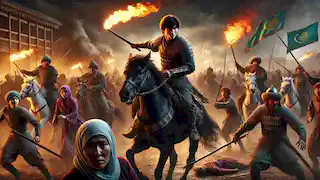
Aliman gathered what remained of the village and addressed them with a voice filled with resolve.
“Our strength lies not in swords alone but in our unity,” he said. “We are one people, bound to this land. I will ride to the other clans and call them to stand with us. Together, we can stop the invaders.”
His mother, Aisha, watched with tears in her eyes as her son mounted Karak and rode into the unknown.
For weeks, Aliman traveled across the steppe, visiting clan after clan. Some welcomed him as Serik’s son, offering food and shelter. Others dismissed him as a dreamer, unwilling to risk their warriors for a unified cause.
In the village of Shyngystau, Aliman met Batyrbek, a wise elder with a reputation for testing the hearts of men.
“What makes you think you can unite us?” Batyrbek asked, his voice sharp as a blade.
“Because I fight for our people, not for myself,” Aliman replied. “Divided, we are weak. Together, we are unstoppable.”
Batyrbek studied the young warrior for a moment, then smiled. “You speak like a leader. Shyngystau will ride with you.”
One by one, other clans began to join Aliman’s cause, drawn by his passion and unwavering belief in their shared destiny.
Forging the Alliance
It took months, but Aliman’s army grew. Warriors, craftsmen, and farmers stood side by side, united under a single banner—a golden sun rising over a blue sky.
With each clan that joined, Aliman’s forces grew stronger, but so too did the tension. Warriors from rival clans eyed each other warily, old grievances threatening to tear the alliance apart.
One night, a fight broke out between two clansmen over a decades-old feud. Aliman called a meeting and addressed the gathered warriors.
“If we cannot set aside our differences, we will lose everything,” he said. “Our enemies are united in their greed. We must be united in our resolve. The steppe does not belong to one clan—it belongs to all of us.”
His words rang true, and the warriors pledged their loyalty—not to Aliman, but to the cause he championed.
The Battle of the Endless Steppe
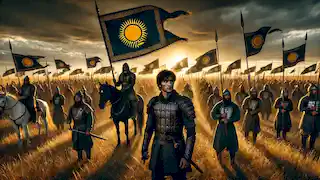
The final battle came as winter approached. The invaders, confident in their numbers, had set up camp near the River Ili, cutting off access to vital grazing lands.
Aliman gathered his generals and laid out his plan. “We will strike at dawn,” he said. “One force will draw them out, and the others will strike from the flanks. We will surround them like wolves closing on their prey.”
The battle began as the first light touched the steppe. Aliman, leading the charge, rode Karak into the heart of the enemy lines, his father’s sword flashing like lightning.
The fighting was brutal, but the Kazakh warriors fought with a fury born of love for their land and people.
At the height of the battle, Aliman faced the enemy warlord—a towering figure clad in black armor. Their duel was fierce, but Aliman’s speed and determination overcame the warlord’s brute strength. With a final strike, Aliman disarmed his foe and forced him to kneel.
“Leave our lands,” Aliman commanded. “And tell your people that the Kazakh steppe is not for the taking.”
The warlord, defeated, withdrew his army.
A New Dawn
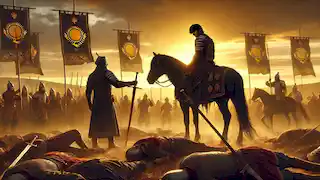
The victory at the River Ili marked the beginning of a new era. Under Aliman’s leadership, the Kazakh clans remained united, working together to rebuild villages, share resources, and defend their homeland.
Songs were sung of Aliman’s bravery, and his name became a symbol of hope and unity. Even after his death, his legacy endured.
The Kazakh steppe, once scarred by war, now flourished under the strength of its people. And in the heart of every Kazakh child, Aliman’s story continued to inspire, reminding them that together, they could overcome any challenge.
Conclusion
The story of Aliman is a testament to the power of unity, resilience, and hope. He was not just a warrior, but a leader who understood the value of people coming together as one. His legacy lives on in the endless steppes of Kazakhstan, where the winds still whisper his name and the golden sun continues to rise over a land forever free.


















